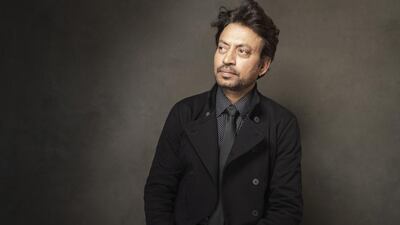From an small role in 1988's Salaam Bombay! to being considered India's most talented export to Hollywood, Irrfan Khan has come a long way.
The road to global fame wasn’t easy. Even as the 49-year-old actor is wooed by Oscar-winning directors for plum assignments, he remembers the frustration of a time when Bollywood didn’t know what to do with him.
That changed with Maqbool (2003), filmmaker Vishal Bhardwaj's Bollywood adaptation of Shakespeare's Macbeth. Khan has since become something of a critics' darling, thanks to stellar performances in films such as The Namesake, D-Day, The Lunchbox and, most recently, Piku and Talvar.
His latest Bollywood film, Madaari, is a "social thriller" about a vigilante who takes matters in his own hands after the deaths of his family. Khan speaks to The National about the film and his arduous but exciting journey as an actor.
Your character Nirmal in Madaari seems quite sinister. Would you say he’s more of an anti-hero?
My role is that of an everyman. It’s based on the belief that there is a hero and a villain in each one of us, lying dormant. Sometimes, in life, things happen that ignite these parts of our personalities. When you can’t accept what happened, you start asking questions and looking for answers.
What draws you to a film? How do you pick your roles?
In Madaari, the kinds of questions that my character asks and the way he deals with his consequences is what drew me to the story. I need stories that resonate with something deep within me. Being able to choose work that speaks to my heart is how I measure success. Money and fame are happy by-products of success, but not my primary motivations.
Are you saying that everything you’ve worked on has spoken to you?
No. Often, there are ideas that excite you, but you have no internal point of reference for how to play the character you’re presented with. That’s when you prove your worth as an actor.
You’ve often been described as an actor without a formula...
That’s a matter of need. In the West, there is a culture of realistic acting. Young actors are taught to think about characters from multiple perspectives. Our acting schools don’t work like that. We’re taught one plus one equals two, and that’s it. No one encourages you to think of a scenario where one plus one could be something else. Which is why actors like me rely on instinct to tell us how to approach characters. I never know how I’m going to play a character beforehand.
Isn’t that a scary place to be in?
I think of it as a wonderful process of learning and discovery. When we were shooting for Haider, I simply couldn’t crack my character no matter how hard I tried. The answer came to me in the form of an Abida Parveen ghazal. The emotion it aroused in me helped me find a connection with my character and I dove in. It was exhilarating.
You’re not a run-of-the-mill Bollywood actor. Does the industry ever frustrate you?
Even after Bollywood realised that I could pull off a film, commercial cinema didn’t know how to use me, which was frustrating. But in the past five years, Bollywood has transformed. Better still, it is the audience that has forced us to change. There are so many takers for diverse cinema, but not enough filmmakers. That is why regional cinema is becoming popular and Hollywood is gaining momentum. They are already a credible threat and will become stronger unless Bollywood steps up and starts delivering. In the future, it’s going to be very difficult for clichéd, formula films to survive. It’s time to nurture a culture of storytelling.
Do you think you’ve got your due in the industry?
Oh, yes. I don’t care about awards – they’re absurd and pointless. I don’t even believe in the National Awards anymore. But I’ve received immense love from my audience, for which I’m grateful.
If awards don’t matter, why was The Lunchbox not being sent to the Oscars made out to be such a big deal?
Because we had a real chance to show the world that Indian cinema could be more than song and dance, and we missed it. Sony execs saw Lunchbox at Cannes and picked it up and they wanted to lobby for it because they were sure they could bring it to nomination stage. That was a huge deal. When we weren't sent, they swore never to pick up an Indian film again. That's why the uproar.
Has Hollywood changed you at all?
Immensely. Hollywood appreciates nuances. Ours is concerned more with the broader strokes. We still believe in telling stories through dialogues – Hollywood focuses on not just the sound, but also the visual aspect of cinema. You can act through your body in Hollywood, make the experience more personal.
• Madaari is in cinemas from Thursday, July 21
artslife@thenational.ae

